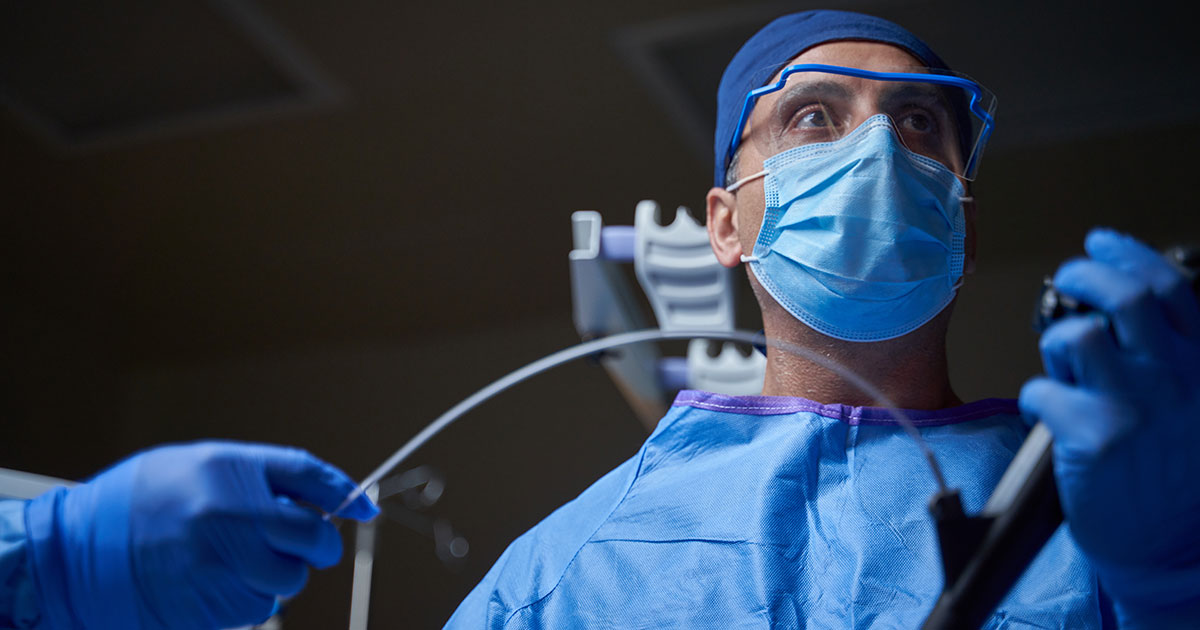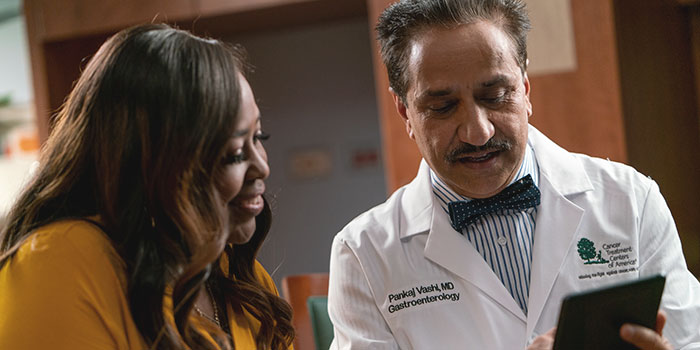
Colonoscopies are modern medicine’s gold standard for detecting cancer in the colon and rectum. Colonoscopies have played a huge role in the overall incidence of colorectal cancer steadily dropping since the mid-1980s. Still, not everyone is getting screened, often out of concern about anesthesia or the unpleasant preparation required.
Now that there’s a less invasive, at-home test on the market that’s a viable alternative to colonoscopy, more people are asking their doctors if it’s right for them.
The answer isn’t always simple, but it is a conversation worth having, says Pankaj Vashi, MD, Head of Gastroenterology/Nutrition and Vice Chief of Staff at City of Hope® Cancer Center Chicago.
In this article, we’ll explore:
If you’ve been diagnosed with cancer and are interested in a second opinion on your diagnosis and treatment plan, call us or chat online with a member of our team.
What can a colonoscopy detect?
A colonoscopy is a test that looks for polyps, potential causes of digestive issues, pre-cancerous tissue and cancer, even before symptoms emerge. During the procedure, a doctor uses a flexible, lighted tube with a small camera at the end to look for swollen tissue, tumors or polyps inside the large intestine (colon) and rectum. Polyps are abnormal growths that develop in the colon and may become cancerous over time if they’re not removed.
If polyps or other types of swollen or irritated tissue are found during a colonoscopy, the doctor usually removes them during the procedure, Dr. Vashi says. The doctor may also take tissue samples, called a biopsy, during a colonoscopy.
“I always tell people that colonoscopy is the only screening test that prevents cancer,” he says. “You can’t say that for any other screening test. If you get a mammogram, for example, and have a lesion, it’s most likely already cancerous. But polyps are precancerous. That means if you take them out, you can actually prevent cancer from developing.”
Until a few years ago, organizations like the American Cancer Society (ACS) recommended people at average risk for colorectal cancer start getting screened at age 50. However, in 2018, ACS lowered the recommended age to 45. In 2021, the U.S. Preventive Services Task Force (USPSTF) followed suit. The reason? Diagnoses in people younger than 50 have been rising by 1 percent to 2 percent a year since the mid-1990s.
“Over the past two decades, we’ve been screening for colon cancer more aggressively in people over age 50, which has led to an overall decline in the number of people with the disease,” Dr. Vashi says. “But during that time, we’ve also noticed an increase in the number of younger people, especially those between the ages of 45 and 50, who are diagnosed with cancer because they aren’t getting screened until age 50.”
While colonoscopy remains the screening tool of choice for detecting colorectal cancer, the accuracy of the test can depend on several factors, including how empty the bowel is (meaning patients have to comply with the preparation process) and the expertise of the doctor performing the procedure is, Dr. Vashi says.
“If it’s performed by the right person under the right conditions, a colonoscopy is very, very sensitive,” he says.
What do colonoscopy results indicate?
While most people are well versed in the preparation process for a colonoscopy—fasting and drinking a laxative to flush out the colon—they’re often much less knowledgeable on what the results of the procedure could mean.
If your doctor doesn’t see anything abnormal during your colonoscopy, you’ll likely hear that your result was normal and you should repeat the test in another 10 years.
If your doctor discovers polyps in the colon, they often remove them if the growths aren’t too large. Larger polyps may need to be removed with surgery. Polyps can either be benign, cancerous or precancerous. When your doctor removes the polyps, a biopsy is typically used to check them for cancer.
Another possible result is irritation or inflammation of the colon, which could be due to infection, medications like non-steroidal anti-inflammatory drugs (or NSAIDs), inflammatory bowel diseases like Crohn’s disease and ulcerative colitis, or cancer.
How does Cologuard work?
In 2014, Cologuard became the first at-home stool test approved by the U.S. Food and Drug Administration to detect cancerous and precancerous genetic markers. The noninvasive test requires a doctor’s prescription and works by analyzing stool for altered DNA and blood.
Once you’ve talked to your doctor about Cologuard screening and a collection kit is requested for you, you’ll receive it on your doorstep. Instructions included with the kit tell you how to collect your sample in the privacy of your own bathroom. After you’ve shipped your kit back, your doctor should receive test results within two weeks.
What happens if you get a positive Cologuard test?
If your Cologuard test returns a negative result, it means the analysis didn’t find DNA changes or blood that could be signs of precancerous growths or cancer. In this case, the ACS recommends repeating the test in three years.
If you receive a positive result, it means the test detected DNA and/or blood in the stool, either due to polyps or cancer. False positives can occur, however. If you have a positive test, your doctor will likely recommend a colonoscopy to rule out cancer. Many patients with colorectal cancer don’t have symptoms and are only diagnosed because of screening tests.
“Once you are positive, you almost have to have a colonoscopy,” Dr. Vashi says. “I’ve had maybe two or three patients who had false positives from Cologuard, where I didn’t find anything, but for the majority of patients who’ve tested positive, I’ve found polyps.”

Colonoscopy vs. Cologuard: How to decide
Like a colonoscopy, Cologuard is covered by Medicare and most insurance plans. It also finds 92 percent of colon cancers and, unlike a colonoscopy, doesn’t require any prep work or dietary or medication restrictions. Still, it’s important to remember that Cologuard is a test for the detection of cancer and can’t be used to prevent cancer, like a colonoscopy, Dr. Vashi says.
If you’re trying to determine which test is best for you, a few factors are worth considering.
One of the benefits of having a colonoscopy instead of Cologuard, for instance, is that if your doctor finds something, like a polyp, he or she may take care of it during the procedure, Dr. Vashi says. Whereas if a Cologuard test detects a polyp, you’ll need a colonoscopy.
On the flip side, of course, Cologuard isn’t invasive and can be performed at home.
In general, Cologuard is the next best option after a colonoscopy, Dr. Vashi says. He adds: “The test is an appropriate alternative for people who are at a low risk for developing colorectal cancer but who may be reluctant to go through the bowel preparation required with a colonoscopy.”
Still, certain people shouldn’t use Cologuard. They include those who are at a high risk for developing colorectal cancer because they either have an inflammatory bowel disease like ulcerative colitis or Crohn’s disease, a personal or family history of colorectal cancer or polyps, or a genetic condition like Lynch syndrome.
People who are at a high risk for developing colorectal cancer may need to begin screening tests earlier than age 45 and have them performed more often.
That’s why talking to your doctor is always the first step.
“I tell primary care doctors to offer colonoscopy as a first choice, but if someone doesn’t want to do it or is asking about Cologuard, that’s OK if they’re low risk,” Dr. Vashi says. “Something is always better than nothing.”
If you’ve been diagnosed with cancer and are interested in a second opinion on your diagnosis and treatment plan, call us or chat online with a member of our team.
